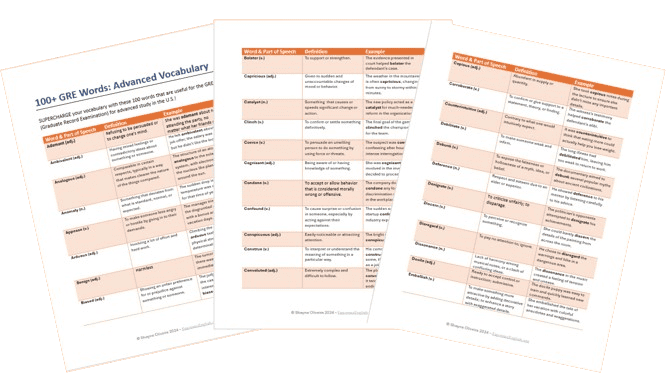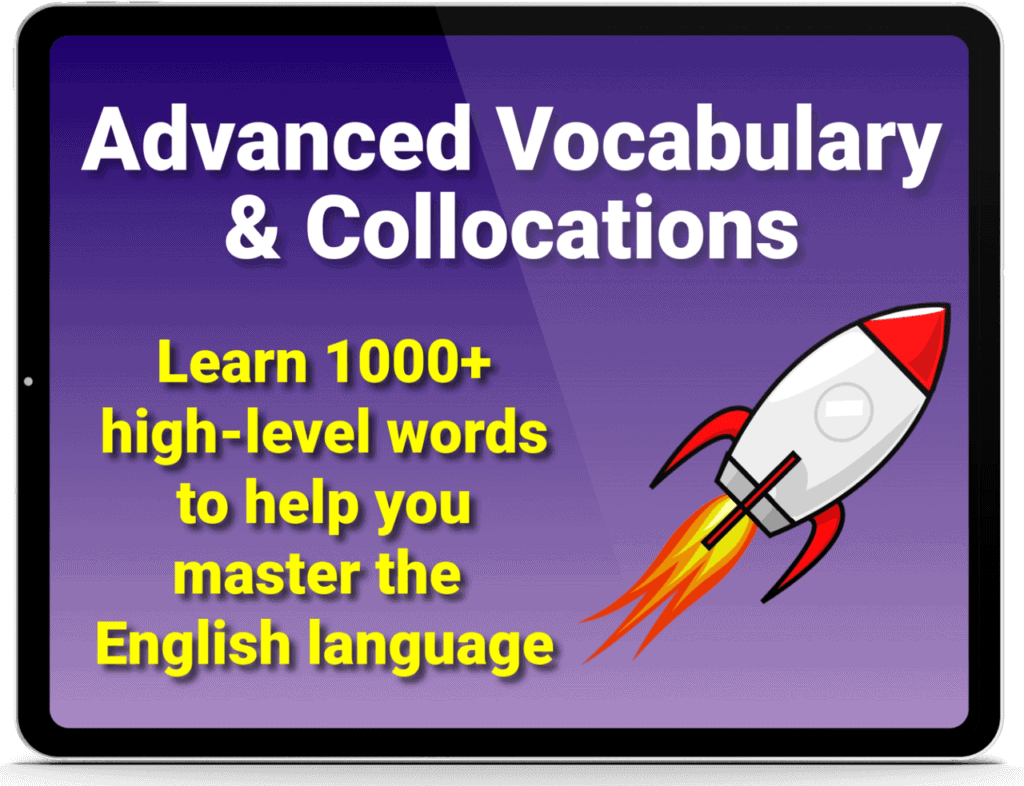
Plethora… dwindle… ambiguous… have you seen these words before?
Today I’ll teach you 20 expert-level English words – and if you know them, it means your vocabulary is incredible! These words are used by highly-educated and articulate native English speakers.
Why not grab a pen and paper to write down the words, and give yourself a check mark by each one you already knew?
I’d also like to give you a gift to really skyrocket your vocabulary – it’s a downloadable PDF of 100 advanced words with definitions and examples. These are words that native English speakers study at the college and graduate-school level.
Our first advanced English word is…
1. Unprecedented (adjective)
Meaning: Never done or experienced before; without previous example
Example: “The pandemic caused an unprecedented shift to online learning.”
2. Adept (adjective)
Meaning: Highly skilled or proficient at something
Example: “She’s adept at explaining complex grammar in a simple way.”
3. Dwindle (verb)
Meaning: To gradually decrease or become smaller
Example: “Attendance at the evening class dwindled after the holidays.”
4. Mitigate (verb)
Meaning: To make something less severe, harmful, or painful
Example: “Wearing a seatbelt can mitigate the risk of injury in an accident.”
5. Plethora (noun)
Meaning: A large or excessive amount of something
Example: “Espresso English offers a plethora of lessons, courses, and e-books.”
6. Ambiguous (adjective)
Meaning: Unclear; open to multiple interpretations
Example: “The instructions were ambiguous, so no one knew what to do.”
7. Scrutinize (verb)
Meaning: To examine very carefully
Example: “Investors will scrutinize the company’s financial statements.”
8. Convey (verb)
Meaning: To communicate or express
Example: “It’s hard to convey sarcasm over text.”
9. Candid (adjective)
Meaning: Honest and direct, even when uncomfortable
Example: “She gave a candid answer about her experience with failure.”
10. Omit (verb)
Meaning: To leave out
Example: “You can omit that paragraph — it’s not essential.”
How are you doing so far? If you find these challenging and interesting, you’ll love the free bonus PDF teaching you 100 more advanced words!
Let’s keep going:
11. Caliber (noun)
Meaning: Level of quality or ability
Example: “They’re hiring someone of the highest caliber for the role.”
12. Prevalent (adjective)
Meaning: Widespread or commonly occurring
Example: “Work-from-home policies have become more prevalent.”
13. Nuance (noun)
Meaning: A subtle or slight difference in meaning or tone
Example: “His performance captured every nuance of the character.”
14. Detrimental (adjective)
Meaning: Harmful or damaging
Example: “Smoking is clearly detrimental to your health.”
15. Discrepancy (noun)
Meaning: A difference between two things that should match
Example: “There’s a discrepancy between the reports and the receipts.”
16. Pivotal (adjective)
Meaning: Critically important or central
Example: “That meeting was a pivotal moment in the negotiation.”
17. Refute (verb)
Meaning: To prove something is false or incorrect
Example: “She refuted the claim with solid evidence.”
18. Resilient (adjective)
Meaning: Able to recover quickly from difficulties; strong and adaptable
Example: “Despite many setbacks, she remained resilient and kept working toward her goal.”
19. Unleash (verb)
Meaning: To release something powerful or intense
Example: “The coach’s speech unleashed a wave of motivation in the team.”
20. Pinnacle (noun)
Meaning: The highest or most successful point of something
Example: “Winning the championship was the pinnacle of his career.”
So, how many of those advanced English words did you know?
If it was 15 or more, congratulations – you have expert-level English vocabulary.
If it was fewer — don’t worry. Because now you know some more advanced vocabulary words you can start using right away. And don’t stop here – go ahead and download the free PDF to learn 100 more.
👉 You can level up your vocabulary even further in the next 6 weeks by joining my Advanced Vocabulary and Collocations Course, where we learn 1000 powerful words and how to put them together naturally.
If you’re already an upper-intermediate or advanced English learner, this course is perfect for taking your English vocab to the next level of fluency and sophistication.









